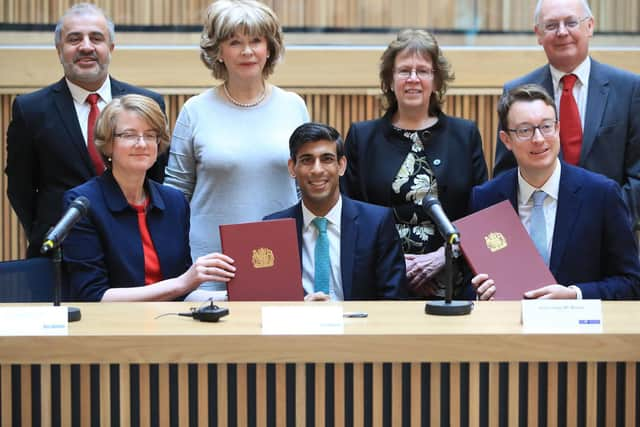West Yorkshire metro mayor can ask council tax payers to help fund key projects
Details of the historic devolution deal, worth £1.8bn to West Yorkshire over 30 years, were revealed today by the Government after an agreement was finally reached between Ministers and local leaders.
As well as access to a West Yorkshire Investment Fund worth £38m and other new sources of funding, the deal gives whoever is elected mayor in May next year a range of powers to raise extra money.
Advertisement
Hide AdAdvertisement
Hide AdThe 31-page documents says the mayor will have the "power to set a precept on local council tax bills to help pay for the Mayor’s work".
Such precepts are common for elected metro mayors but not all choose to take them up. Sheffield City Region mayor Dan Jarvis said he would not following the example of metro mayors in Greater Manchester and the Liverpool City Region by imposing a mayoral precept in South Yorkshire.
In addition the mayor will have the power to introduce a supplement on business rates to pay for projects that promote local economic development, though this would require a ballot of affected businesses.
The West Yorkshire Combined Authority would also be able to seek consent to raise a 'strategic infrastructure tariff' to raise money for major projects, potentially including a mass transit system.


Advertisement
Hide AdAdvertisement
Hide AdIt will be given powers to borrow money to carry out its work, allowing it to "invest in economically productive infrastructure, subject to an agreed cap with HM Treasury".
And it could collect contributions from utility firms for any diversionary works needed as a result of highways works carried out on the so-called 'Key Route Network' covering the busiest roads in the county.
The power to set up the 400-mile key route network, which would be overseen and managed by the mayor rather than local councils, was among those handed to West Yorkshire in the devolution deal.
Chancellor Rishi Sunak described the devolution deal as setting "an example for the country to follow" as he signed it alongside the leaders of Leeds, Bradford, Kirklees, Wakefield and Calderdale on Thursday.
Advertisement
Hide AdAdvertisement
Hide AdAn agreement between government and West Yorkshire leaders was announced in the Budget the previous day, bringing to an end a five year saga over the transfer of powers and funding from Whitehall.
As part of the deal the mayor will have control of a £63m annual adult education budget previously held by government and powers to "acquire and dispose of land to build houses, commercial space and infrastructure, for growth and regeneration".
According to the document: "With a population of over 2.3 million people and a gross value added (GVA) of over £55bn p.a., West Yorkshire offers enormous potential.
"Sizeable parts of West Yorkshire enjoy a great quality of life, good wages, and lower living and housing costs, and for many the region is a great place to live, work, visit and invest.
Advertisement
Hide AdAdvertisement
Hide Ad"But substantial long-term investment and greater powers are needed, to tackle the challenges facing the region, and to harness its huge economic opportunity for the benefit of people in the region and for the whole UK.
"The West Yorkshire deal will unlock significant long-term funding and give the region greater freedom to decide how best to meet local needs and create new opportunity for the people who live and work there. This agreement is the first step in a process of further devolution."
In January, Local Government Minister Simon Clarke said he supported elected mayors having "skin in the game" by raising their own funds locally rather relying on resources from the Government.
With Tory metro mayors Andy Street and Ben Houchen refusing so far to levy a mayoral precept, Mr Clarke said: "This is one of the issues which mayors have to form a judgement on and be accountable on.
Advertisement
Hide AdAdvertisement
Hide Ad"For what this is worth, I think it is helpful, if mayors have skin in the game when it comes to major funding decisions. It is for each of them to work out the right balance and clearly there's no point levying tax without very clear reasons but equally it's part of their toolkit, it's clear that is an option they have open to them.
"If they can see clear priorities and when public consent for that, it's absolutely something which is open to them, we don't criticise at all people seeking to raise revenue for key projects."
